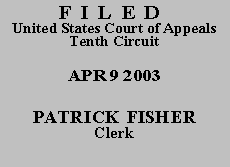

| JEBORAH DIEBOLD,
Plaintiff-Appellant, v. SPRINT/UNITED MANAGEMENT COMPANY, Defendant-Appellee. |
|
Plaintiff/appellant Jeborah Diebold appeals from the district court's order dismissing, for failure to state a claim, her diversity action alleging retaliatory discharge for whistleblowing. Our jurisdiction arises under 28 U.S.C. § 1291. We conclude that Ms. Diebold failed to allege facts supporting her claim that defendant Sprint terminated her in retaliation for reporting Sprint's violation of laws pertaining to public health, safety, or general welfare. Thus, we affirm.
We review the dismissal under Fed. R. Civ. P. 12(b)(6) de novo, accepting all well-pleaded factual allegations as true and viewing them in the light most favorable to appellant. Sutton v. Utah State Sch. for Deaf & Blind, 173 F.3d 1226, 1236 (10th Cir. 1999). Dismissal is not proper "unless it appears beyond doubt that the plaintiff can prove no set of facts in support of [her] claim which would entitle [her] to relief." Id. (quotation omitted).
To state a claim for retaliatory discharge under Kansas law, Ms. Diebold had to allege facts showing that she had a reasonable, good faith belief that Sprint "was engaged in activities in violation of rules, regulations, or the law pertaining to public health, safety, and the general welfare," that she reported the violation "to either company management or law enforcement officials," and that she was "discharged in retaliation for making the report." Palmer v. Brown, 752 P.2d 685, 690 (Kan. 1988). As the district court pointed out, Ms. Diebold did not allege that Sprint violated any laws, however. She alleged only that Sprint required her to retract an e-mail that she sent to fellow employees regarding an alleged Anthrax scare on threat of termination if she refused to retract it; that Sprint told her its Public Relations and Corporate Security departments would handle its public response to the Anthrax scare; that she sought to stop Sprint from some unspecified "unlawful conduct" by communicating with "higher authorities of Sprint regarding her concern for the health and safety of workers and the general public," and that, after she did so, Sprint told her she was terminated for reporting "the Anthrax to others" without the authority to do so. Aplt. App. at 49-50. We agree with the district court that these facts simply do not identify what Sprint did to violate any policy, regulation, or law such that a claim has been stated for retaliatory discharge.
Ms. Diebold's conclusory argument that "Sprint violated OSHA and other state laws when it's [sic] Lenexa facility and machine which sent out mail to employees and the public was shut down for contamination of Anthrax," Aplt. Br. at 7, is frivolous. For a company to respond to an Anthrax scare by temporarily shutting down a facility for investigation is not a violation of any law. Likewise, her claim that "[t]he Lenexa facility as well as the machines created a hazardous working environment which clearly violated OSHA," id., does not allege that Sprint violated the law. This is especially true given her factual allegations (which we accept as true for purposes of our analysis) that Sprint "notified the Department of Health regarding the Anthrax," "isolated the equipment in its Lenexa, Kansas facility and tested and/or decontaminated the equipment for Anthrax," "shut down its Lenexa facility for a period of time after the equipment [sic] to decontaminate the facility and/or the equipment," and that "due to the contamination of Anthrax and/or possible contamination of Anthrax, employees of defendant . . . were provided with antibiotics and/or other medication for Anthrax exposure." Id. at 48-50.
Although Ms. Diebold in her reply brief alleges that she was terminated for reporting "unsafe working conditions (Anthrax in machine that sends out Mail to Customers and Employees)," Reply Br. at 5, her amended complaint does not make that allegation. In fact, the amended complaint establishes that Sprint quickly responded to the Anthrax scare by shutting down the plant, isolating the equipment, and testing and/or decontaminating it before Ms. Diebold even sent her first e-mail.
The judgment of the United States District Court for the District of Kansas is AFFIRMED. Appellant's motion to file reply brief out of time is granted.
Entered for the Court
Circuit Judge
*. This order and judgment is not binding precedent, except under the doctrines of law of the case, res judicata, and collateral estoppel. The court generally disfavors the citation of orders and judgments; nevertheless, an order and judgment may be cited under the terms and conditions of 10th Cir. R. 36.3.